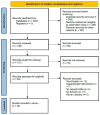Prevalence and Etiology of Community- and Hospital-Acquired Pneumonia in Saudi Arabia and Their Antimicrobial Susceptibility Patterns: A Systematic Review
- PMID: 37109718
- PMCID: PMC10143967
- DOI: 10.3390/medicina59040760
Prevalence and Etiology of Community- and Hospital-Acquired Pneumonia in Saudi Arabia and Their Antimicrobial Susceptibility Patterns: A Systematic Review
Abstract
(1) Background and Objectives: Pneumonia is a major cause of morbidity and mortality worldwide, including in Saudi Arabia, and the prevalence and etiology of the disease varies depending on the setting. The development of effective strategies can help reduce the adverse impact of this disease. Therefore, this systematic review was conducted to explore the prevalence and etiology of community-acquired and hospital-acquired pneumonia in Saudi Arabia, as well as their antimicrobial susceptibility. (2) Materials and Methods: The Preferred Reporting Items for Systematic Reviews and Meta-Analyses (PRISMA) 2020 recommendations were followed for this systematic review. Several databases were used to perform a thorough literature search, and papers were then assessed for eligibility by two independent reviewers. The Newcastle-Ottawa Scale (NOS) was used to extract the data from the relevant research and evaluate its quality. (3) Results: This systematic review included 28 studies that highlighted the fact that gram-negative bacteria, particularly Acinetobacter spp. and Pseudomonas aeruginosa, were the common cause of hospital-acquired pneumonia, while Staphylococcus aureus and Streptococcus spp. were responsible for community-acquired pneumonia in children. The study also found that bacterial isolates responsible for pneumonia showed high resistance rates against several antibiotics, including cephalosporins and carbapenems. (4) Conclusions: In conclusion, the study found that different bacteria are responsible for community- and hospital-acquired pneumonia in Saudi Arabia. Antibiotic resistance rates were high for several commonly used antibiotics, highlighting the need for rational antibiotic use to prevent further resistance. Moreover, there is a need to conduct more regular multicenter studies to assess etiology, resistance, and susceptibility patterns of pneumonia-causing pathogens in Saudi Arabia.
Keywords: Saudi Arabia; antimicrobial susceptibility; community-acquired pneumonia; etiology; hospital-acquired pneumonia; prevalence.
Conflict of interest statement
The authors declare no conflict of interest.
Similar articles
-
Interventions to improve antibiotic prescribing practices for hospital inpatients.Cochrane Database Syst Rev. 2017 Feb 9;2(2):CD003543. doi: 10.1002/14651858.CD003543.pub4. Cochrane Database Syst Rev. 2017. PMID: 28178770 Free PMC article.
-
Home treatment for mental health problems: a systematic review.Health Technol Assess. 2001;5(15):1-139. doi: 10.3310/hta5150. Health Technol Assess. 2001. PMID: 11532236
-
Health professionals' experience of teamwork education in acute hospital settings: a systematic review of qualitative literature.JBI Database System Rev Implement Rep. 2016 Apr;14(4):96-137. doi: 10.11124/JBISRIR-2016-1843. JBI Database System Rev Implement Rep. 2016. PMID: 27532314
-
Signs and symptoms to determine if a patient presenting in primary care or hospital outpatient settings has COVID-19.Cochrane Database Syst Rev. 2022 May 20;5(5):CD013665. doi: 10.1002/14651858.CD013665.pub3. Cochrane Database Syst Rev. 2022. PMID: 35593186 Free PMC article.
-
The measurement and monitoring of surgical adverse events.Health Technol Assess. 2001;5(22):1-194. doi: 10.3310/hta5220. Health Technol Assess. 2001. PMID: 11532239
Cited by
-
Compassionate use of contezolid in a toddler with severe community-acquired pneumonia induced by staphylococcus aureus: a case report and follow-up.Front Pediatr. 2024 Feb 7;12:1321447. doi: 10.3389/fped.2024.1321447. eCollection 2024. Front Pediatr. 2024. PMID: 38384659 Free PMC article.
-
Ongoing Strategies to Improve Antimicrobial Utilization in Hospitals across the Middle East and North Africa (MENA): Findings and Implications.Antibiotics (Basel). 2023 Apr 28;12(5):827. doi: 10.3390/antibiotics12050827. Antibiotics (Basel). 2023. PMID: 37237730 Free PMC article.
-
Immunomodulatory Effects of Fluoroquinolones in Community-Acquired Pneumonia-Associated Acute Respiratory Distress Syndrome.Biomedicines. 2024 Mar 29;12(4):761. doi: 10.3390/biomedicines12040761. Biomedicines. 2024. PMID: 38672119 Free PMC article. Review.
-
Etiology of bacterial pneumonia and multi-drug resistance pattern among pneumonia suspected patients in Ethiopia: a systematic review and meta-analysis.BMC Pulm Med. 2024 Apr 16;24(1):182. doi: 10.1186/s12890-024-03000-1. BMC Pulm Med. 2024. PMID: 38627640 Free PMC article.
References
-
- Troeger C.E., Blacker B.F., Khalil I.A., Zimsen S.R., Albertson S.B., Abate D., Abdela J., Adhikari T.B., Aghayan S.A., Agrawal S. Mortality, morbidity, and hospitalisations due to influenza lower respiratory tract infections, 2017: An analysis for the Global Burden of Disease Study 2017. Lancet Respir. Med. 2019;7:69–89. doi: 10.1016/S2213-2600(18)30496-X. - DOI - PMC - PubMed
-
- Ghia C.J., Dhar R., Koul P.A., Rambhad G., Fletcher M.A. Streptococcus pneumoniae as a cause of community-acquired pneumonia in Indian adolescents and adults: A systematic review and meta-analysis. Clin. Med. Insights Circ. Respir. Pulm. Med. 2019;13:1179548419862790. doi: 10.1177/1179548419862790. - DOI - PMC - PubMed
Publication types
MeSH terms
Substances
LinkOut - more resources
Full Text Sources
Medical
Miscellaneous


